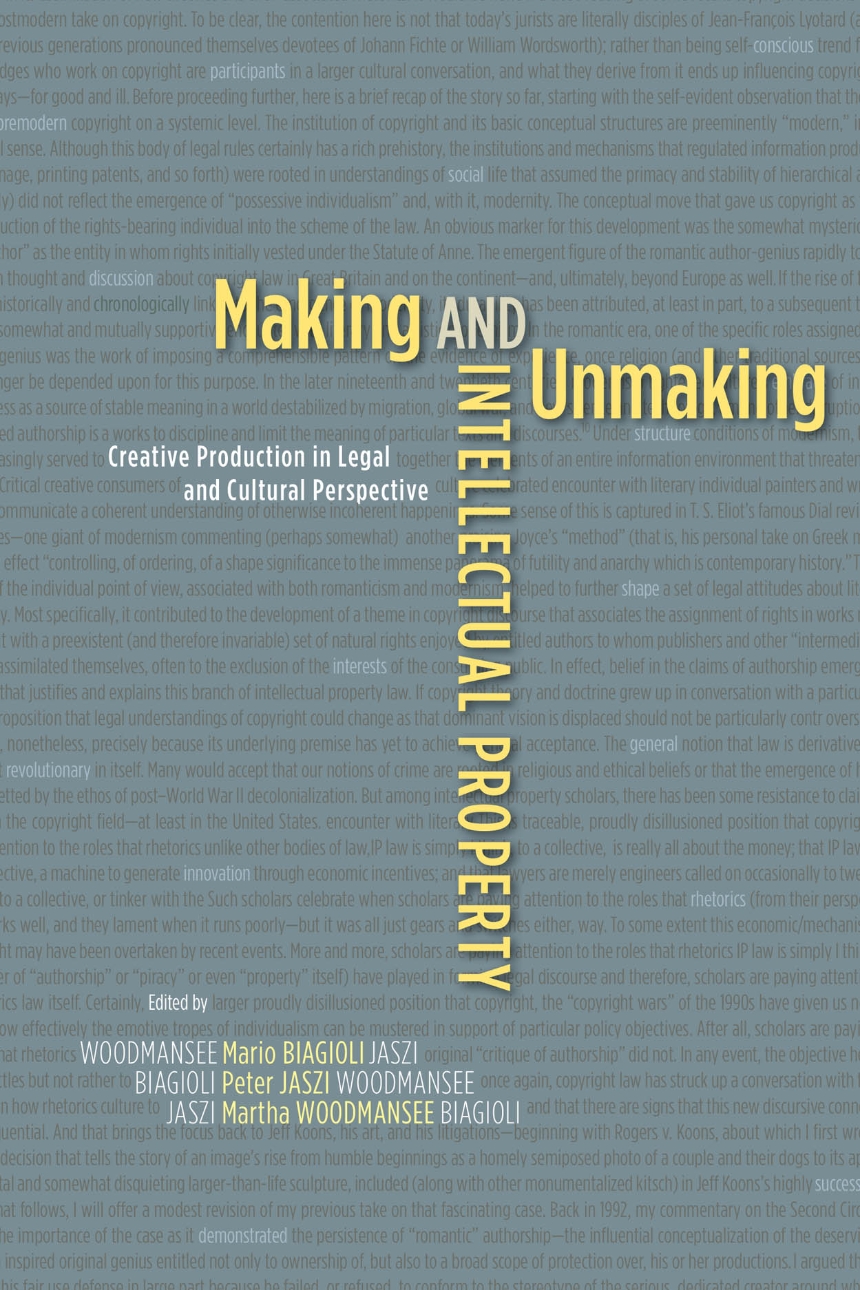Making and Unmaking Intellectual Property
Creative Production in Legal and Cultural Perspective
Making and Unmaking Intellectual Property
Creative Production in Legal and Cultural Perspective
Rules regulating access to knowledge are no longer the exclusive province of lawyers and policymakers and instead command the attention of anthropologists, economists, literary theorists, political scientists, artists, historians, and cultural critics. This burgeoning interdisciplinary interest in “intellectual property” has also expanded beyond the conventional categories of patent, copyright, and trademark to encompass a diverse array of topics ranging from traditional knowledge to international trade. Though recognition of the central role played by “knowledge economies” has increased, there is a special urgency associated with present-day inquiries into where rights to information come from, how they are justified, and the ways in which they are deployed.
Making and Unmaking Intellectual Property, edited by Mario Biagioli, Peter Jaszi, and Martha Woodmansee, presents a range of diverse—and even conflicting—contemporary perspectives on intellectual property rights and the contested sources of authority associated with them. Examining fundamental concepts and challenging conventional narratives—including those centered around authorship, invention, and the public domain—this book provides a rich introduction to an important intersection of law, culture, and material production.
480 pages | 39 halftones, 3 line drawings, 7 tables | 6 x 9 | © 2011
Culture Studies:
History: History of Ideas
Law and Legal Studies: General Legal Studies
Reviews
Table of Contents
Introduction
1. Patent Specification and Political Representation: How Patents Became Rights / Mario Biagioli
2. Authoring an Invention: Patent Production in the Nineteenth-Century United States / Kara W. Swanson
3. The “Person Skilled in the Art” Is Really Quite Conventional: U.S. Patent Drawings and the Persona of the Inventor, 1870–2005 / William Rankin
II. Before and after the Commons and Traditional Knowledge
4. Cultural Agencies: The Legal Construction of Community Subjects and Their Properties / Rosemary J. Coombe
5. Social Invention / Marilyn Strathern
6. From “Folklore” to “Knowledge” in Global Governance: On the Metamorphoses of the Unauthored / Marc Perlman
7. Inventing Copyleft / Christopher Kelty
8. Designing Cooperative Systems for Knowledge Production: An Initial Synthesis from Experimental Economics / Yochai Benkler
III. IP Crimes and Other Fictions
9. Beyond Representation: The Figure of the Pirate / Lawrence Liang
10. Publishers, Privateers, Pirates: Eighteenth-Century German Book Piracy Revisited / Martha Woodmansee
11. The Property Police / Adrian Johns
12. Characterizing Copyright in the Classroom: The Cultural Work of Antipiracy Campaigns / Tarleton Gillespie
13. An Economic View of Legal Restrictions on Musical Borrowing and Appropriation / Peter DiCola
IV. Old Things into New IP Objects
14. New Blood, New Fruits: Protections for Breeders and Originators, 1789–1930 / Daniel J. Kevles
15. Kinds, Clones, and Manufactures / Alain Pottage and Brad Sherman
16. No Patent, No Generic: Pharmaceutical Access and the Politics of the Copy / Cori Hayden
17. Inventing Race as a Genetic Commodity in Biotechnology Patents / Jonathan Kahn
18. The Strange Odyssey of Software Interfaces as Intellectual Property / Pamela Samuelson
V. Doing and Undoing Collaborative IP
19. Invention, Origin, and Dedication: Republishing Women’s Prints in Early Modern Italy / Evelyn Lincoln
20. Technological Platforms and the Layers of Patent Data / Tim Lenoir and Eric Giannella
21. Intellectual Property Norms in Stand-Up Comedy / Dotan Oliar and Christopher Sprigman
22. Patenting Life: How the Oncomouse Patent Changed the Lives of Mice and Men / Fiona Murray
23. Is There Such a Thing as Postmodern Copyright? / Peter Jaszi
Contributors
Index
